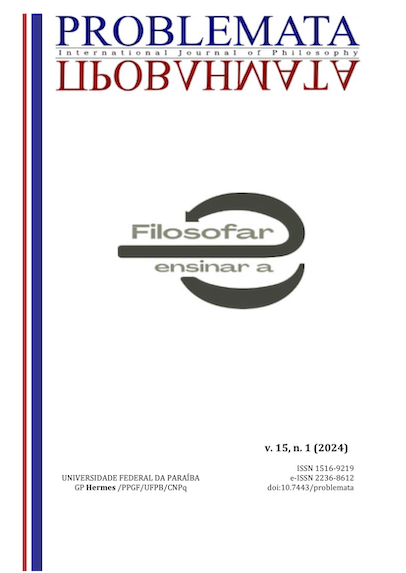CHILDHOOD, CHILDREN AND PHILOSOPHY:
POSSIBILITIES FOR PHILOSOPHICAL THOUGHT EXPERIMENTS
DOI:
https://doi.org/10.7443/problemata.v15i1.70237Keywords:
Experience, Philosophy with Children, Philosophy for Children, ChildhoodAbstract
This text comes from a paper given at the event "VII National Meeting of the ANPOF WG Philosophizing and Teaching to Philosophize: thinking the field, philosophizing teaching", which took place in 2023 in Santa Maria, RS. The writing deals with elements of our Master's research in Education, which is still in progress, and deals with some interlocutions between philosophy, childhood and education, three powers that, when articulated, legitimize the participation of children as producers of philosophy. Due to the breadth of the research, the section here highlighted the question about the possibilities of the experience of thought in the school practice of philosophy with children. Based on bibliographical research, the concepts of children and childhood were presented descriptively, with the aim of developing some arguments about the signs of thought experience in philosophical practice with children at school. The partial conclusions obtained show that the experience of thinking in the practice of philosophy with children occurs in the encounter with elements that drive children's thinking. The study highlights the importance of thinking about ways to strengthen the defense of philosophy and its relationship with children and childhoods.
Downloads
References
ARENDT, Hannah. Entre o passado e o futuro. Trad. de Mauro W. Barbosa, 8. ed. São Paulo: Perspectiva, 2016.
ARROYO, Miguel. A infância interroga a pedagogia. In: SARMENTO, Manuel; GOUVEA, Maria Cristina Soares (Org.). Estudos da Infância: Educação e Práticas Sociais. Petrópolis: Vozes, 2009, p. 119-140.
CIRINO, Maria Reilta Dantas. Filosofia com Crianças: cenas de Experiências em Caicó (RN), Rio de Janeiro (RJ) e La Plata (Argentina). Rio de Janeiro: NEFI, 2016.
DUHART, Olga Grau. De tábulas rasas a sujeitos encarnados. In: KOHAN, Walter Omar (Org.). Lugares da infância: filosofia. Rio de Janeiro: D&A, 2004.
DUHART, Olga Grau. Filosofía, educación e infancia. Revista Sul-Americana de Filosofia e Educação (RESAFE), n. 11, p. 3-13, 2011.
KANT, Immanuel. Sobre a Pedagogia. Trad. de Francisco Cock Fontanella. Piracicaba: Editora Unimep, 1996.
KOHAN, Walter Omar. Ensino de filosofia. Belo Horizonte: Autêntica, 2002.
KOHAN, Walter Omar. Filosofia para Crianças. Rio de Janeiro: DP&A, 2000.
KOHAN, Walter Omar. Infância, estrangeiridade e ignorância: ensaios de filosofia e educação. Belo Horizonte: Autêntica, 2007.
KOHAN, Walter Omar. Lugares da infância: Filosofia. Rio de Janeiro: DP&A Editora, 2004.
LÓPEZ, Maximiliano Valerio. Acontecimento e experiência no trabalho filosófico com crianças. Rio de Janeiro: Ed. Autêntica, 2008.
MARQUES, Luciana Pacheco; OLIVEIRA, Cristiane E. A.; SANTOS, Núbia Schaper. Da necessidade de interrogar o pensamento: gestos sobre a infância no tempo escolar. Childhood & philosophy, v. 14, n. 30, p. 341-362, 2018.
MEDEIROS, Daniela Gomes; SANTOS, Bruna C. L. Siqueira. A infância: de que infância está se falando. In: SILVA, Carolina Fontana da; SCHUTZ, Litiéli Wollmann (Org.). Infâncias e Juventudes em diferentes contextos. São Paulo: Pimenta Cultural, 2019, v. 1, p. 27-42.
NIEHUES, Mariane Rocha; COSTA, Marli De Oliveira. Concepções de infância ao longo da história. Revista Técnico-Científica do IFSC, p. 284-289, 2012.
PINHEIRO, Maria do Carmo Morales. A constituição do conceito de infância e algumas questões relativas ao corpo: da idade média à modernidade. Revista Poíesis Pedagógica, v. 1, n. 1, p. 48-62, 2003.
SANTOS, Juliara Dias dos; MOLINA, Adão Aparecido. Infância e história: a criança na modernidade e na contemporaneidade. Travessias, v. 13, n. 1, p. 189-204, 2019.
SCHÉRER, René. Infantis: Charles Fourier e a infância para além das crianças. Belo Horizonte: Autêntica, 2009.
Downloads
Published
Issue
Section
License
Copyright (c) 2024 Vitória Albert Sauzem

This work is licensed under a Creative Commons Attribution 4.0 International License.
Authors who publish with this journal agree to the following terms:
- Authors retain copyright and grant the journal right of first publication with the work simultaneously licensed under a Creative Commons Attribution License that allows others to share the work with an acknowledgement of the work's authorship and initial publication in this journal.
- Authors are able to enter into separate, additional contractual arrangements for the non-exclusive distribution of the journal's published version of the work (e.g., post it to an institutional repository or publish it in a book), with an acknowledgement of its initial publication in this journal.
-
- Authors are permitted and encouraged to post their work online (e.g., in institutional repositories or on their website) prior to and during the submission process, as it can lead to productive exchanges, as well as earlier and greater citation of published work (See The Effect of Open Access).





